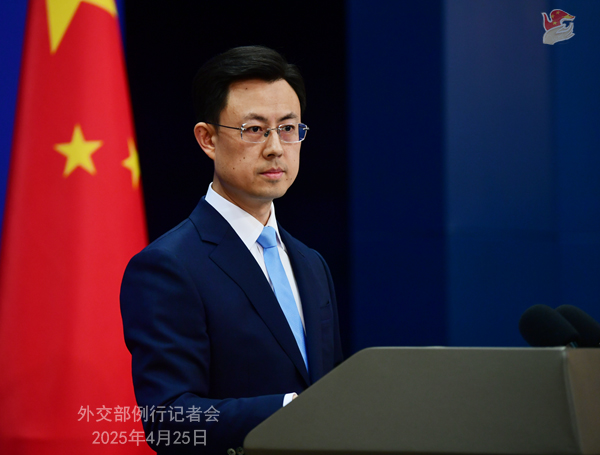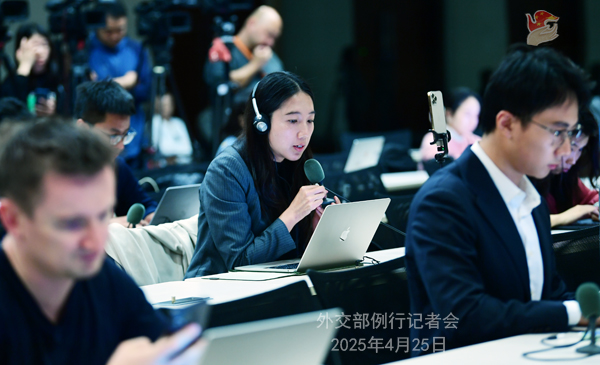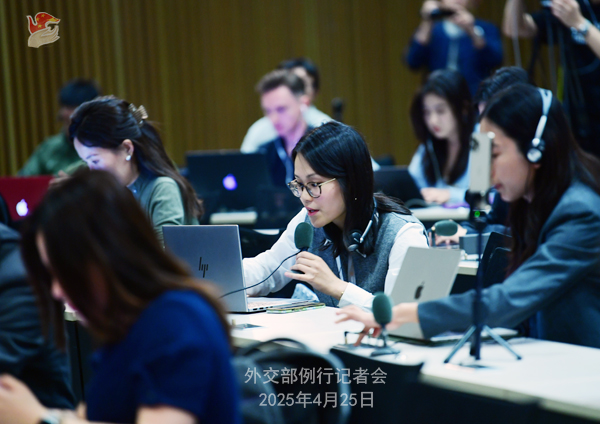
The People’s Republic of China


Global Times: It’s reported that talks continue between the U.S. and China on tackling the fentanyl issue, but the Chinese are failing to negotiate in good faith. The U.S. might consider additional punitive measures to compel China to take meaningful action. This is according to U.S. officials familiar with the matter. What’s your comment?
Guo Jiakun: Fentanyl is the U.S.’s problem, not China’s. The U.S. and the U.S. alone has the responsibility to solve it. Despite the goodwill China has shown, the U.S. slapped tariffs on Chinese imports and blames it on fentanyl. This is bullying through and through, and highly damaging to dialogue and cooperation on counternarcotics. The U.S. should know that vilifying others will not hide its failed responsibility, to punish those who try to help will not solve any problem, and intimidation or threats are certainly not the right way to engage with China.
Reuters: I have two questions. The U.S. side said that trade talks between the U.S. and China are ongoing and a White House official said lower-level in-person talks as well as a phone call between U.S. and Chinese staff have taken place this week. Has the U.S. tried to reach out to the Chinese side? If so, is China willing to engage in trade talks? Second question, China is considering exempting some U.S. imports from its 125 percent tariffs and is asking businesses to identify goods that could be eligible. Can China confirm this?
Guo Jiakun: On your first question, yesterday, both my colleague at the Ministry of Commerce and I gave a clear answer to this question. China and the U.S. are not having any consultation or negotiation on tariffs. The U.S. should stop creating confusion.
On your second question, I am not aware of the specifics. I’d refer you to competent authorities.
CCTV: Recently the Permanent Mission of China to the UN held an Arria-formula meeting at the UN Security Council on “the Impact of Unilateralism and Bullying Practices on International Relations” in New York. Can you share more information about that?
Guo Jiakun: On April 23, Ambassador Fu Cong of the Permanent Mission of China to the UN chaired the UN Security Council Arria-Formula Meeting on “the Impact of Unilateralism and Bullying Practices on International Relations.” Representatives from over 80 countries, including UNSC members, attended the meeting. China stressed at the meeting that the U.S.’s tariff levies severely infringe upon the legitimate rights and interests of all countries, severely violate the WTO rules, and severely disrupt the global economic order. It is essentially about subverting the existing international economic and trade order by means of tariffs, putting the U.S. interests above the common good of the international community, and serving U.S. hegemony at the cost of other countries’ legitimate interests. The world needs openness and inclusiveness, not closure and isolation, sovereign equality, not the strong bullying the weak, fairness and justice, not putting one’s own country first, and solidarity and cooperation, not division and confrontation. The international community must make the right choice, make its unified voice heard, and take joint actions.
Many countries at the meeting called for upholding multilateralism, strengthening dialogue and cooperation, safeguarding the WTO-centered multilateral trade regime, abiding by the UN Charter and basic norms governing international relations, safeguarding the legitimate rights and interests of developing countries and promoting the stability and development of all countries.
We hope the U.S. will face up to the widespread concerns and strong call from the international community at the meeting, stop unilateral measures and bullying practices targeting other countries, and stop serving its own hegemony at the cost of other countries’ legitimate interests. The world should not return to the law of the jungle where the strong bully the weak. The U.S. should not go further down the wrong path.
Reuters: Who will China send to Pope Francis’ funeral?
Guo Jiakun: I have no information to offer at the moment.
Shenzhen TV: The U.S. State Department recently issued the so-called 2025 Adherence to and Compliance with Arms Control, Nonproliferation, and Disarmament Agreements and Commitments. What’s China’s response to that?
Guo Jiakun: The U.S. government has concocted the so-called Adherence to and Compliance with Arms Control, Nonproliferation, and Disarmament Agreements and Commitments year after year in disregard of facts. It has said nothing about the U.S.’s own negative moves in arms control, nonproliferation and disarmament, but instead has blamed other countries and made groundless vilification against them. This is typical hegemonic logic and double standards. China has made clear its opposition more than once and lodged serious protests.
In the work of arms control and nonproliferation worldwide, China has remained committed to true multilateralism, firmly safeguarded the international system with the UN at its core and the international order based on international law, earnestly fulfilled its international obligations and commitments, and taken concrete actions to uphold the international arms control and nonproliferation system.
In recent years, the U.S. has vigorously built up its military strength, instigated major-country confrontation and gravely undermined global and regional strategic stability. The U.S. has wantonly withdrawn from international treaties and organizations, ignored international order, rules and obligations, and acted as the biggest disruptor to the international arms control and nonproliferation system. How ironic it is that the U.S. issued such a report. We urge the U.S. to take a hard look at itself, take active actions to respond to international concerns over its own compliance with relevant agreements, and earnestly fulfill its international obligations and commitments, rather than divert attention and shirk responsibility by slinging mud at China.
China News Service: Yesterday, the Shenzhou-20 crewed spaceship blasted off successfully. Recently, China has worked with multiple countries in space cooperation, which was well received by other parties. That said, a handful of Western media say that relevant cooperation brings so-called threats to and risks for space. What’s your comment?
Guo Jiakun: On April 24, which marks China’s 10th Space Day, the Shenzhou-20 crewed spaceship blasted off successfully. For years, China has made steady progress in its space exploration and has been working with more and more space cooperation partners. China signed nearly 200 intergovernmental space cooperation agreements with over 50 countries and international organizations. We initiated multilateral cooperation programs, including the BRICS Remote Sensing Satellite Constellation and the Belt and Road space information corridor. We signed a cooperation agreement with Pakistan on selecting and training astronauts, worked with Brazil to jointly develop an earth resource satellite, helped Global South countries train their own astronauts, and promoted technology sharing. In the near future, China’s Chang’e-7 will head to the moon, carrying international payloads from Egypt, Bahrain, Thailand, Italy, and Switzerland. In the exploration of the universe, China will always work with the rest of the world for the benefit of humanity.
AFP: The U.S. issued an executive order on deepsea mining to obtain critical minerals. This move was opposed by environmentalists. What is China’s response?
Guo Jiakun: The international seabed area covered by the U.S. executive order goes beyond the limit of national jurisdiction. According to international law, the international seabed area and its resources are the common heritage of mankind. The exploration and exploitation of minerals in the international seabed area must be carried out in accordance with the United Nations Convention on the Law of the Sea and under the framework of the International Seabed Authority (ISA). The legal status and the exploitation and exploration regime of the international seabed are universally recognized and followed through in international practice. No country should circumvent the ISA and international law and privately authorize any exploitation and exploration activities in the international seabed area at the expense of the common interests of the international community.
This executive order also covers continental shelf beyond 200 nautical miles from U.S. coast, which the U.S. illegally delimited. The U.S. move to authorize exploration and exploitation of mineral resources on its so-called “extended continental shelf” violates international law and harms the collective interests of the international community.
The U.S. move is a unilateral practice and once again reveals its hegemonic nature. It shows the U.S. would brush aside international law and international order in pursuit of its selfish interests.

Xinhua News Agency: We noted that the 163rd regular session of the Council of the League of Arab States at the ministerial level adopted the Arab-China resolution. It was reaffirmed that the Arab states support the one-China principle and the Belt and Road Initiative. They welcomed China to hold the second China-Arab States Summit in 2026 and appreciated China’s diplomatic efforts in promoting regional peace and security. What’s your comment?
Guo Jiakun: The Council of the League of Arab States at the ministerial level specially adopted the China-friendly resolution for the 45th time straight. We highly appreciate it. The resolution fully demonstrates the resolute determination of the Arab states to grow their relations with China and the importance they have attached to the second China-Arab States Summit.
Thanks to the strategic guidance of heads of state of China and Arab states, the current China-Arab relationship is at its best in history. The two sides have rendered each other firm support on issues concerning each other’s core interests, the Belt and Road cooperation yielded fruitful results, and trade volume between China and the Arab states surged to over US$400 billion. The two sides are committed to promoting regional peace and stability, and upholding international fairness and justice, which fully speaks to the high level of China-Arab strategic partnership. In May last year, President Xi Jinping attended the opening ceremony of the 10th ministerial meeting of the China-Arab States Cooperation Forum and delivered a keynote speech. President Xi announced that we will host the second China-Arab States Summit in China in 2026, which will be another milestone in China-Arab relations. China stands ready to work with Arab states to take the second Summit as an opportunity to jointly achieve modernization and build a China-Arab community with a shared future at a higher level.
EFE: According to international media, Norwegian sports organization has advised its athletes not to eat any kind of meat while competing in China due to fears it could lead to a positive doping test. Does the Foreign Ministry have any comment on this recommendation and the concern it raises about food safety for international athletes in China?
Guo Jiakun: This is not a question about China’s diplomacy. I’d refer you to competent authorities.
Beijing Daily: Recently when asked during a media interview whether Latin American countries should follow Panama’s suit by exiting the Belt and Road Initiative and whether they should choose sides between the U.S. and China, U.S. leader replied, “Maybe, in a certain way.” What is China’s comment on this?
Guo Jiakun: We noted the reports. Latin American and Caribbean countries are independent sovereign countries. Other countries are in no position to tell them what to do, still less publicly or privately coerce and threaten them. China is a country that believes in mutual respect, equality and openness and we always strive to be inclusive and seek mutual benefit. This is also what guides our friendly cooperation with Latin American and Caribbean countries, and such cooperation has contributed substantially to the welfare of the peoples of both sides.
Bloc confrontation is not welcome in today’s world and not conducive to global prosperity. Anyone engaged in bloc confrontation will achieve nothing in the end. The U.S. should stop pressuring Latin American countries to choose sides, and instead make tangible efforts for the region’s stability and development.
AFP: The French government yesterday said it hopes that China and the EU can build a united front on addressing climate change. France said that it could make up for the damage caused by the U.S.’s withdrawal from the Paris Agreement. Is China willing to stand side-by-side with the EU on climate response?
Guo Jiakun: We’ve stressed more than once that climate response is not something asked of us, but something we are doing on our own initiative. Addressing climate change is what we must do if China wants to achieve sustainable development and also part of what China is willing to fulfill for the world to build a community with a shared future for mankind. China has developed the world’s largest clean energy supply system and the most complete new energy industrial chain. China will make the world’s biggest cut in carbon emission intensity in the shortest time frame ever seen in history. No matter how the international landscape may change, China will work with European countries and other parties to resolutely defend true multilateralism, stay committed to the full and effective implementation of the UNFCCC and the Paris Agreement with goodwill, make concerted effort in addressing the global challenge of climate change and jointly advance green and low-carbon development.
AFP: The U.S. side said yesterday that Boeing should default China for not taking the three planes that China committed to purchase, and this is just a small example of what China has done to the U.S. for years. What’s China’s response?
Guo Jiakun: I’d refer you to competent authorities for anything specific.
Bloomberg: PBOC Governor Pan and Finance Minister Lan are in the U.S. right now. Will they hold talks with Treasury Secretary or anybody else in the U.S. administration in the coming days?
Guo Jiakun: The governmental agencies concerned have released information on the Chinese delegation’s attendance at relevant meeting. I refer you to these agencies if you have any specific questions.




